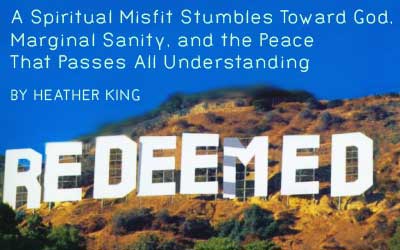Life
Redeemed

The Christian religion is only for one who needs infinite help. That is, only for one who feels infinite anguish. The whole earth can suffer no greater torment that a single soul. The Christian faith—as I see it—is one’s refuge in this ultimate torment. Anyone to whom it is given in this anguish to open his heart, instead of contracting it, accepts the means of salvation in his heart.
—Ludwig Wittgenstein
I don’t know about you, but this is the kind of quote that makes me feel right at home. This gives me hope. Anguish, torment—this Wittgenstein is a man who understands. So do Maria Callas, Renaissance painter Matthias Grünewald, and the people in charge of adorning Mexican churches. I love a good statue of Jesus with a hole ripped in his chest and his sacred heart hemorrhaging blood. Nobody knew better than Christ that people to whom everyday things like holding a job or interacting with another human being are never-ending sources of torture and anxiety are exactly the ones most in need of healing. A guy who hung out with lepers, paralytics, the possessed: this is someone I can trust. We don’t have to go up to him, he comes down to us. We want a doctor, a hospital, meds; he gives us himself. We want to stop the suffering; he says, I’ll suffer with you.
Like many children of the ’60s, I grew up not believing in much of anything. This was through no fault of my decent hardworking, self-sacrificing (if ever so slightly overburdened) parents. My father was a bricklayer who worked his fingers to the bone to support seven brothers and sisters and me. My mother was a housewife who sent us all to Sunday school at the Congregational Church across the street, played hymns on the piano, and (no doubt desperately trying to stave off the inchoate sense that half of us would grow up to be alcoholics and/or addicts) was given to sayings like “Pride goeth before a fall” and “The road to hell is paved with good intentions.” In white Anglo-Saxon, pre-Vatican II, Protestant New Hampshire (I was going to add “rural,” but that would have been redundant), Catholicism was for Italians. Catholicism was for people from May-ass (“May,” short for Massachusetts) who smoked cigarettes and had plastic Marys on their dashboards. Catholicism was for rollicking Irish families, not shut-down, inward looking, abstemious, frugal, non-risk-taking folks such as us.
As a kid, and for a long time afterward, my basic idea toward God was: if I follow the rules—if I’m good—he won’t hurt me. Now I see that’s the whole problem. In fact, trying to be good in a way makes me bad, makes me dishonest. Whereas if I just face that I’m a sinner from the ground up—I’d sell my mother’s soul for a drink, some sugar, fifteen minutes of sex—I might actually start to get somewhere. Alcoholics and addicts know this kind of thing about themselves, which is why, in spite of their other myriad shortcomings, they tend to be the funniest, and often oddly spiritual people on earth. Of course I would think that being one myself. In fact, I have a theory that’ll all addiction is, at bottom, a search for God.
Think about it: the blackout—a crude form of mystical union; the willingness to sacrifice reputation, family, money, health, one’s very life—a twisted martyrdom. Sometimes I think anyone as drawn as I am to suffering would have had to become a Catholic. But truly, it’s a gift to have seen the depths to which I’ll fall, the extent to which I’ll compromise myself, the lengths to which I’m willing to go to avoid God. The problem with avoiding God is that next thing I know, I’ve latched onto something outside myself, established a substitute God; and he, she, or it is holding me in complete bondage. To me, the fall doesn’t mean I’m bad (though in one way I actually am pretty bad) and that God hates me. It means I’m broken and I need help.
Alcoholism is an interesting phenomenon. It’s the universal perverse tendency toward self-sabotage, except taken to the nth degree. Normal people look at an alcoholic and think, She drinks like me—just more. But it’s a difference in kind, not degree: for the person predisposed to alcoholism, the very first drink begins setting up a mental obsession and physical craving—in essence, a for of insanity—that is entirely beyond the normal drinker’s ken. Alcoholic drinking is only a symptom—of a soul divided deeply against itself; of mental, emotional, and, above all, spiritual conflict. The conflict is of a soul in which the universal human thirst for connection, meaning, love has gone terribly awry—a soul in the grip of a compulsion that has seized upon a substitute for love and made it into a god.
Everybody’s spiritually sick to one degree or another, of course, but what’s interesting about alcoholism is that if I don’t tend to my spiritual sickness, I’ll die. I’ll pick up a drink, or a crack pipe, or a Xanax or three million, and die. Or I’ll kill myself. Or I’ll get so crazy someone else will kill me. It’s a condition that, over the years, has tended to grab my attention. As one of my sober friends says, “I’m not on a spiritual path because I’m so spiritual, I’m on a spiritual path because I’m so not spiritual.”
And while following the rules isn’t in and of itself the answer, once on the spiritual path, I do follow certain principles, certain rules. I follow the rules not out of gratitude: for having gotten sober, for the ability to walk, see, breathe; for life. The irony is that I find when I’m on fire with gratitude, I’ll not only refrain from cheating, lying, and stealing: I’ll do way more than that. “Do not think I have come to abolish but to fulfill,” Christ said (Matthew 5:17), and I think what he meant was that I’ll live in a whole different way. I’ll “waste” time, commit crazy acts of generosity, interact with all manner of extremely unpromising people. I’ll quit the job I hate and, though scared senseless, start doing the work I’ve wanted to do my whole life. I’ll get out of the relationship that is killing me, over and over again, and finally, finally, finally discover it wasn’t the relationship, it was me, and it’s not his fault, and my mother did the best she could, and it’s nobody’s job to make me happy, I have to do it myself, and lo and behold, it turns out, want to do it myself; that’s all I want. I’ll be like Zacchaeus, the puny publican who climbed the sycamore to get a glimpse of Jesus (Luke 19:1-10): willing to make a fool of myself, to be enthusiastic.
But when I’m enthusiastic, when I extend a hand to the next person, I can’t do it from the level of “I’m up here and you’re down there.” I do it because I realize I need it just as much as he or she does. I “boast of my weakness,” as St Paul did (2 Corinthians 12:9), because I can hardly believe—clueless and fallen as I basically still am—that I’m in even marginally good enough shape so I can help someone else, to be kind to someone else. That’s the only point of the spiritual path: to get in good enough shape so I can help someone else. But not like the Pharisee who stood at the front of the church, regarded the lowlifes in the back, and said, “Thank you, God, for making me so perfect, and man, I am glad I’m not as screwed up as they are” (Luke 18:9-14). I have to be like the tax collector who stood at the back of the church, hanging his head, and said, “Oh my God, I can’t believe you even let me in, I can’t believe there’s a place for me. Thank you so much and please forgive me and help me to be better.”
It hurts to participate, to keep our hearts open when we’re in anguish, but as Wittgenstein observed, this is the means of our salvation. This is Christ nailed, arms open, to the cross, simultaneously utterly vulnerable and utterly powerful: the most radical, subversive, never-endingly surprising Savior I can imagine. Turning his own agony, to the thief beside him to say, “This day you shall be with me in Paradise,” he’s the Great Physician, the Great Priest, the Great Friend. When I picture Christ, though, he’s not only, or even mostly, on the cross. He’s coming down off the cross, walking among us. He’s saying, I know, it hurts unbelievably most of the time, but look, here’s how to make it better. He’s saying, Don’t worry, you won’t see how for a while, but it’s all gonna come together in the end. He’s saying, It’s all right already: right here, right now. He’s here to help, he’s here to help. Not a pious image, but a pulsing heart. A warm body. Blood.
Read Ron Wall’s profile of Heather King and Redeemed here.
Reprinted by arrangement with Viking, a member of Penguin Group (USA) Inc., from Redeemed by Heather King. Copyright (c) 2008 by Heather King







